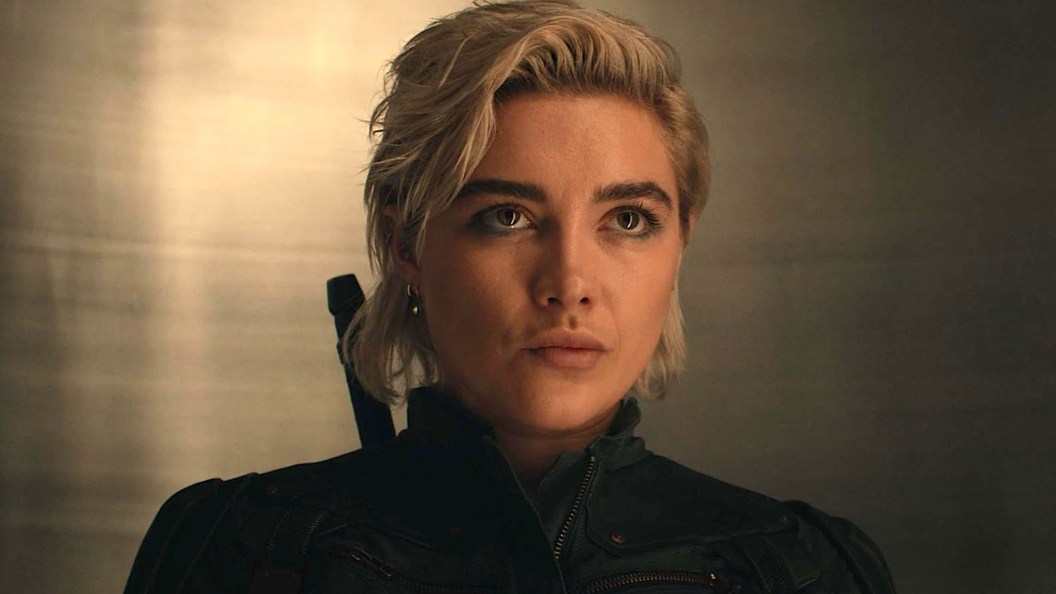
Florence Pugh’s Yelena Belova has quickly risen from a newcomer to a formidable face of the Marvel Cinematic Universe over three franchise appearances. A former Red Room assassin and the younger adopted sister of Natasha Romanoff/Black Widow (Scarlett Johansson), Yelena follows an arc that equally emphasizes her lethal combat skills and deep-rooted humanity, harmonizing to forge a fascinating three-dimensional anti-hero. Boasting some of the most hilarious and heart-wrenching scenes in the MCU, Yelena brings so much life to the franchise. The character’s arc plays perfectly to Pugh’s strengths, as the Oscar nominee impressively delivers humor and emotional depth as Yelena.
From reuniting with Natasha and their adoptive parents in Black Widow to pursuing Clint Barton (Jeremy Renner) in Hawkeye to forming an unlikely team with fellow anti-heroes in Thunderbolts*, Yelena’s story has generated plenty of standout moments that prove she is one of the new faces of the MCU.
1) Yelena Proudly Shows Natasha Her Vest

After the estranged sisters reunite in Black Widow, Yelena shows her green tactical vest to Natasha, raving about its handy pockets. Natasha initially isn’t impressed by the garment, but eventually admits to Yelena that she likes it. This wholesome exchange illustrates Yelena’s adaptation to living life on her own terms after being freed from the Red Room, as she reveals that the vest is the first piece of clothing she has ever bought herself. Yelena’s vest takes on an even bigger meaning when she gives it to Natasha as a parting gift at the end of Black Widow, adding a heartwarming piece of backstory to the vest Natasha wears at different points in Avengers: infinity War and Avengers: Endgame. A symbol of Yelena’s newfound independence, the vest begins as a delightful joke and ends as a poignant representation of sisterhood.
2) Yelena Mocks Black Widow’s Pose (Twice)
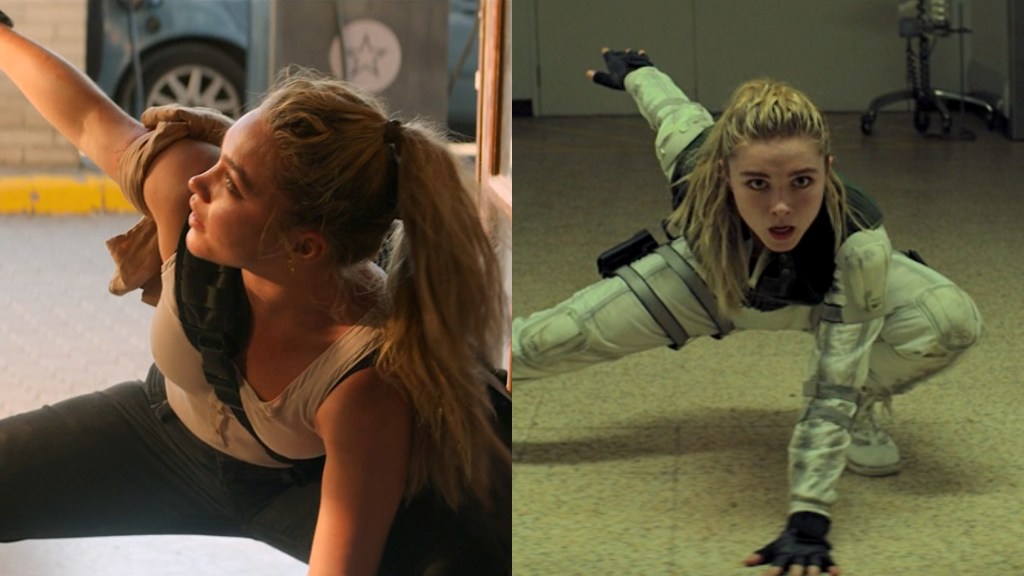
Among Black Widow‘s funniest moments are the two instances when Yelena hilariously mocks Natasha’s superhero pose. While picking up supplies at a gas station in Budapest, Yelena asks Natasha why she always does the “Thing that you do when you whip your hair when you’re fighting, with the arm and the air,” and jokingly imitates the stance. Later, while infiltrating the Red Room, Yelena jumps down from a ceiling duct and ironically lands in Natasha’s pose, shaking in disgust afterward. Yelena’s mockery of her sister for being a “total poser,” is a brilliant comedic moment that pokes fun at Marvel’s longstanding attachment to Natasha’s stylish superhero move — even though it isn’t at all practical. Beyond its obvious humor, Yelena’s replication of the iconic Black Widow pose signals her own evolution into a superhero as she follows in her sister’s footsteps.
3) “It Was Real to Me”

Before tearing down General Dreykov’s (Ray Winstone) Red Room, Yelena, Natasha, and Alexei Shostakov/Red Guardian (David Harbour) descend upon Melina Vostokoff’s (Rachel Weisz) homestead outside of St. Petersburg. There, they sit down for a meal together as they reflect on their time posing as an American family in Ohio and the years that have passed since they last saw one another. At one point during the conversation, Natasha bitterly claims their family wasn’t real. Dismayed, Yelena tearfully opens up to the group, delivering the famous line, “It was real to me,” and declaring that their family was all she ever had and loved as a child.
In Black Widow‘s most heart-wrenching scene, Yelena’s unprocessed trauma resurfaces, and she vents her agony before those who didn’t intervene when she was kidnapped and turned into a mind-controlled assassin. A moment of such raw vulnerability rarely occurs in the MCU, and Pugh superbly communicates Yelena’s pain.
4) Yelena Frees Dreykov’s Widows and Destroys the Red Room
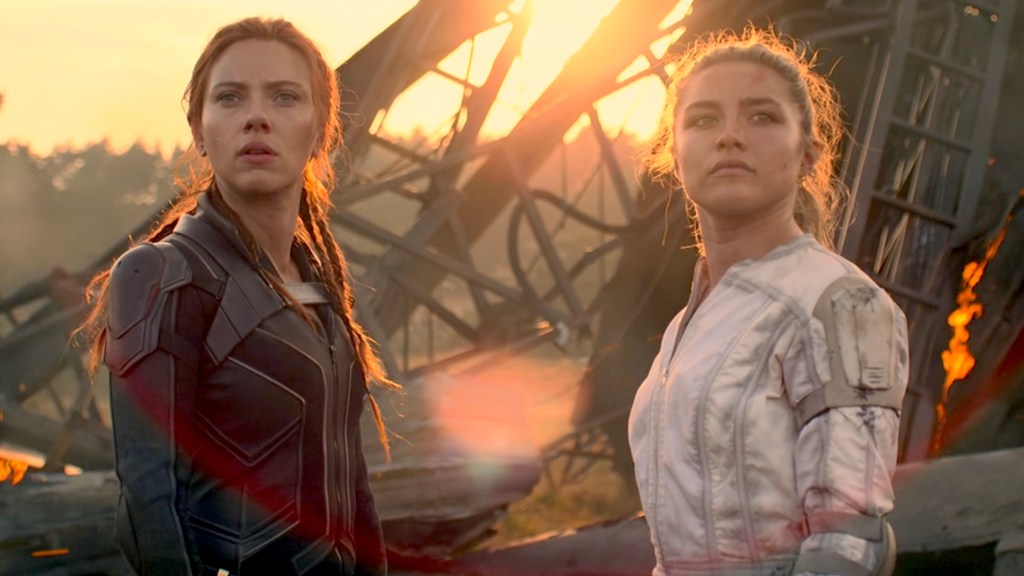
Black Widow‘s third act revolves around the family’s mission to take down Dreykov and the Red Room. Once inside, Yelena is tasked with liberating the Widows using an antidote for their chemical mind control. She attaches the vials to a grenade and tosses it in the air, dispersing the counteragent and freeing the Widows. The sequence of events, which ends with Dreykov dead and the Red Room in ruins, serves as the culmination of Yelena’s initial journey as a freed Widow in search of a purpose.
As the catalyst for their family’s reconnection and effort to destroy the Red Room, Yelena cements herself as a determined and compassionate individual. Yelena could have easily gone off on her own after defecting from the Red Room, but her choice to grant the same independence to all of her fellow Widows — at the Red Room and around the world — proves that she’s far greater than a typical trained killer.
5) Yelena Surprises Kate Bishop in Her Apartment
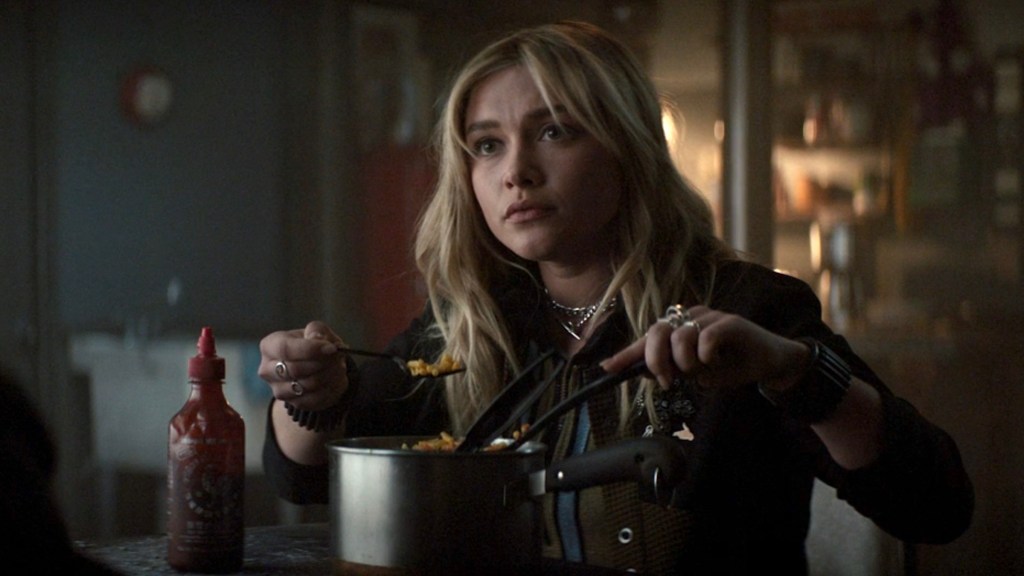
Returning in Hawkeye on a mission to kill Clint, Yelena sneaks into Kate Bishop’s (Hailee Steinfeld) apartment and awaits her arrival with a pot of boxed mac and cheese. Although Kate appears uneasy at the presence of a “bloodthirsty vigilante,” in her home, Yelena keeps her cool and chats about Christmas and the best sights in New York City while eating the mac and cheese. Yelena eventually discloses her identity to Kate and shares that she’s there to kill Clint.
[RELATED: Thunderbolts* Cements Florence Pugh’s Yelena Belova as the Better Black Widow]
The conversation quickly turns from charming and funny to fiery and tense. Pugh once again demonstrates her flawless comedic delivery, then seamlessly summons Yelena’s vicious side as the character condemns Clint and the Avengers for Natasha’s death. It’s an excellent illustration of the silliness, conviction, and anguish Yelena exhibits in new life following the Blip and the death of her sister. An acting masterclass and a top-notch piece of character development, this Hawkeye scene is worth watching over and over again.
6) Yelena Fights Clint and Learns the Truth About Natasha’s Death

In Hawkeye‘s finale, Yelena surprise-attacks Clint near the Rockefeller Center’s Christmas tree. Yelena asks Clint how Natasha’s death happened, but doesn’t buy Clint’s insistence that the late Black Widow sacrificed herself. Furious, Yelena tells Clint that he “should have fought harder” to save Natasha, and attacks him, only stopping when Clint replicates the two-tone whistles she and Natasha used to exchange. Clint elicits an emotional reaction from his assassin by recounting Natasha’s stories about Yelena and their childhood, and the two tearfully express their love for the fallen hero. The range of emotions Pugh conjures in this sequence is nothing short of remarkable, as Yelena experiences all of the phases of grief during her confrontation with Clint. Yelena’s denial of Clint’s account turns to anger at him for failing to save Natasha, and she breaks down in tears before helping Clint up and leaving the scene.
Pugh’s talent is on full display here, and it acts as a captivating display of heartache, resentment, and acceptance. Moreover, Yelena’s pursuit of Clint powerfully embodies the visceral humanity the MCU has granted Pugh’s character. In Hawkeye, she’s flawed, susceptible to misdirection, and blames the wrong people for her despair, but in the end, Yelena has a genuine heart. Even in her darkest moments, Yelena proves capable of rising above her faults. This uncanny combination of moral grayness resilience immensely factors into Yelena’s status as one of the MCU’s most fascinating characters.
7) Yelena Leaps From a Skyscraper in the Opening Scene of Thunderbolts*

Thunderbolts* produces an all-time great MCU movie opening. Yelena stands at the edge of a skyscraper, narrating in the background, “There’s something wrong with me. An emptiness. I thought it started when my sister died, but now it feels like something bigger. Just a void,” before stepping off the building. Tasked with destroying an O.X.E laboratory, Yelena parachutes down, enters the building, and swiftly eliminates her targets. A breathtaking introduction to the plot of Thunderbolts*, the movie’s opening sequence spotlights Yelena’s depressive state of mind and immersion in her work to keep her sadness at bay. At Pugh’s insistence to perform the stunt, she jumped off of the second-tallest building in the world, the Merdeka 118 in Kuala Lumpur, Malaysia. The heavy atmosphere, the closeup on Yelena’s vacant expression, and her stunning plummet from the skyscraper are fantastically executed in this scene.
8) Yelena Has a Heart-to-Heart With Alexei
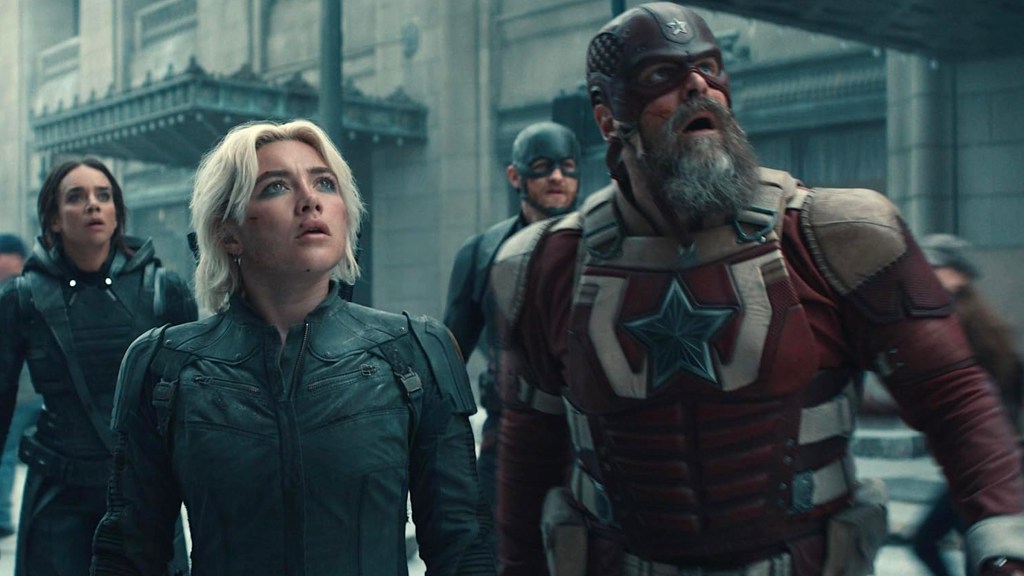
After the Thunderbolts get beat up by the Bob Reynolds/the Sentry (Lewis Pullman), they wander the streets of New York with ill tempers. In one moment, Yelena lashes out at Alexei for not contacting her for an entire year. Through tears, she stresses to her dad that she’s so lonely and that all she does is work, drink, and think about all of the terrible things she’s done. “If you cared, you would have called,” she tells him. “I lost my sister again, but forever, and you disappeared.” Alexei’s foolishness subsides, and he encourages Yelena by reminiscing about how special she was as a child and reminding her that she wanted to be the goalie of her childhood soccer team so she could be the one everyone can rely on if they make a mistake.
Similar to her Black Widow scene, Yelena pours out her emotions and bares her deepest inner turmoil. Thunderbolts* brings the human side of its central anti-heroes to the forefront of the story, and its focus on Yelena’s struggle to find meaning in what she does and lack of a support system strengthens her characterization as a prolific, yet embattled, killer. Pugh delivers yet another MCU highlight in this Thunderbolts* scene, capturing Yelena’s profound sadness and longing for the comfort of a loved one.
9) Yelena Enters the Void

While her fellow Thunderbolts stand around without an answer for the Void’s takeover of Manhattan, Yelena takes it upon herself to do what no one else would. She steps into the Void’s menacing shadow hoping to find and rescue Bob, though unaware of what will happen to her. Yelena traverses a series of rooms containing traumatic memories of her Red Room training, as well as her current self in a depressed, alcohol-addicted state. Eventually, Yelena encounters Bob and offers him the comfort he needs. Yelena’s willingness to take giant risk to save a friend epitomizes her kindness toward those she can relate to. Lost and unhappy at the beginning of Thunderbolts* sees her struggle mirrored in Bob, prompting their strong bond. During the movie’s climactic sequence in the Void, Yelena discovers that she can both help and be helped by those around her.
10) Yelena Initiates the Group Hug That Defeats the Void
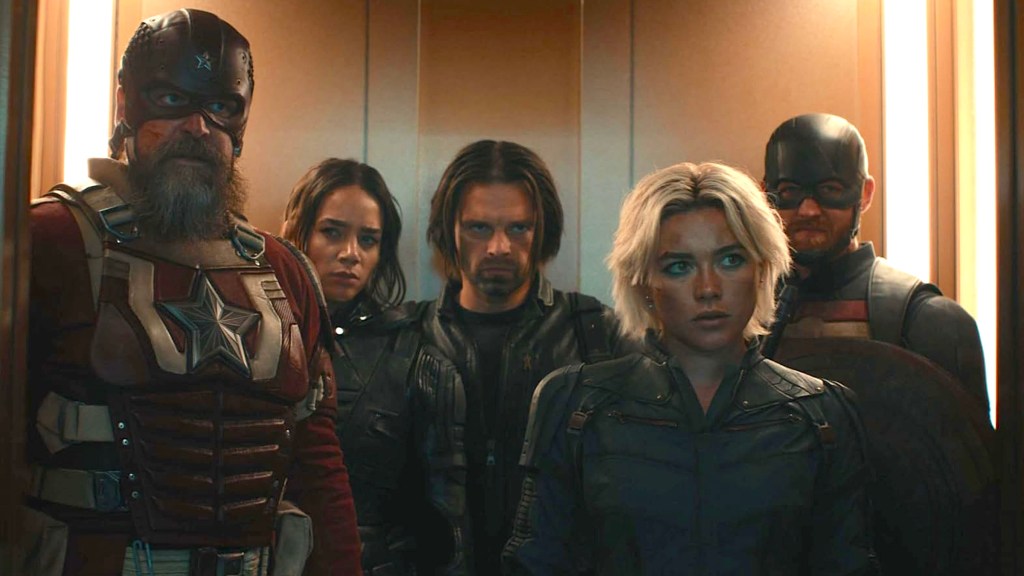
Yelena’s Thunderbolts* journey reaches its culmination she and the rest of the team are trapped in the laboratory room of the Void. As Bob repeatedly punches the Void to no avail, Yelena breaks free from her restraints, runs to him, puts her arms around him, and says, “I’m here. You’re not alone.” The other Thunderbolts follow suit, and their group makes the Void disappear. Yelena’s embrace of Bob in a grueling moment is staggeringly beautiful, packing the perfect emotional punch to complete the movie’s mental health-centric message. Ultimately, Thunderbolts* proves that each of its morally-gray characters has a heart, and in Yelena’s case, her relentless killing doesn’t obscure her relatable struggles and need for a support system. In one heartwarming moment, Thunderbolts* establishes Yelena as a force of a human, not just a hero.
Thunderbolts* is now playing in theaters.
The post 10 Yelena Belova Moments That Prove She’s the Best MCU Character Post-Avengers: Endgame appeared first on ComicBook.com.

